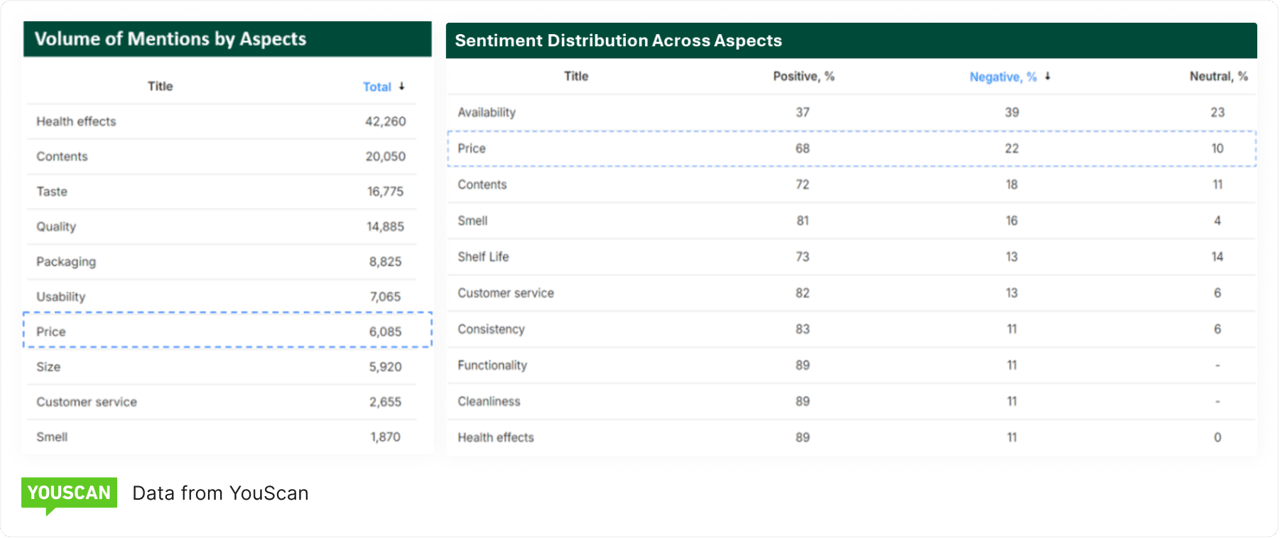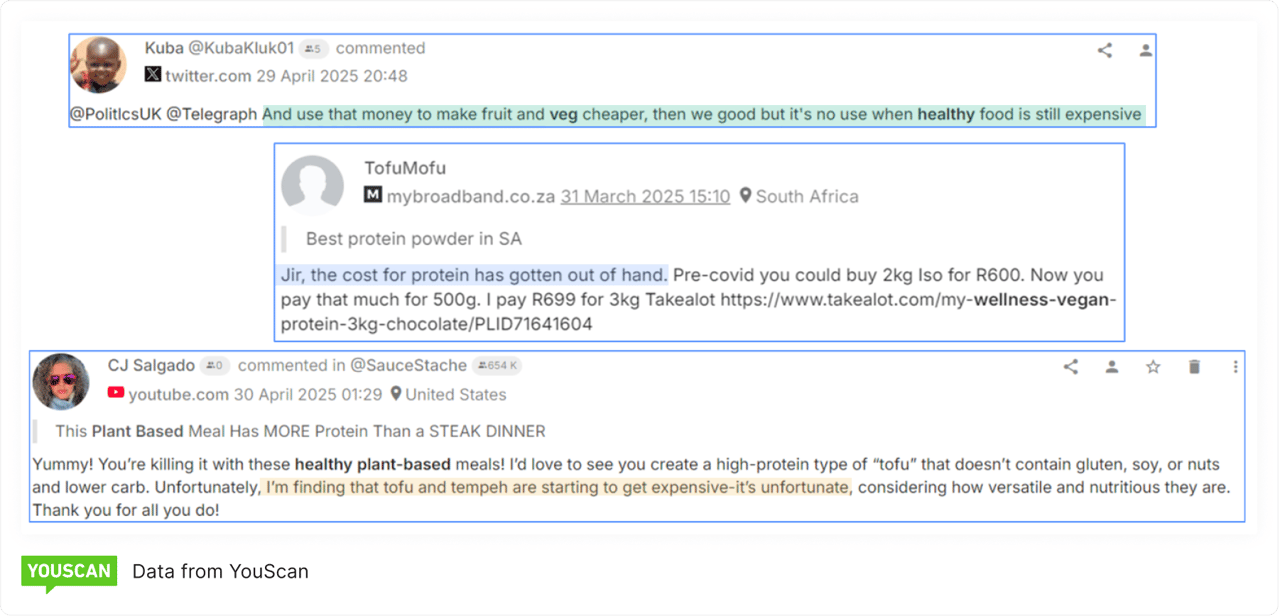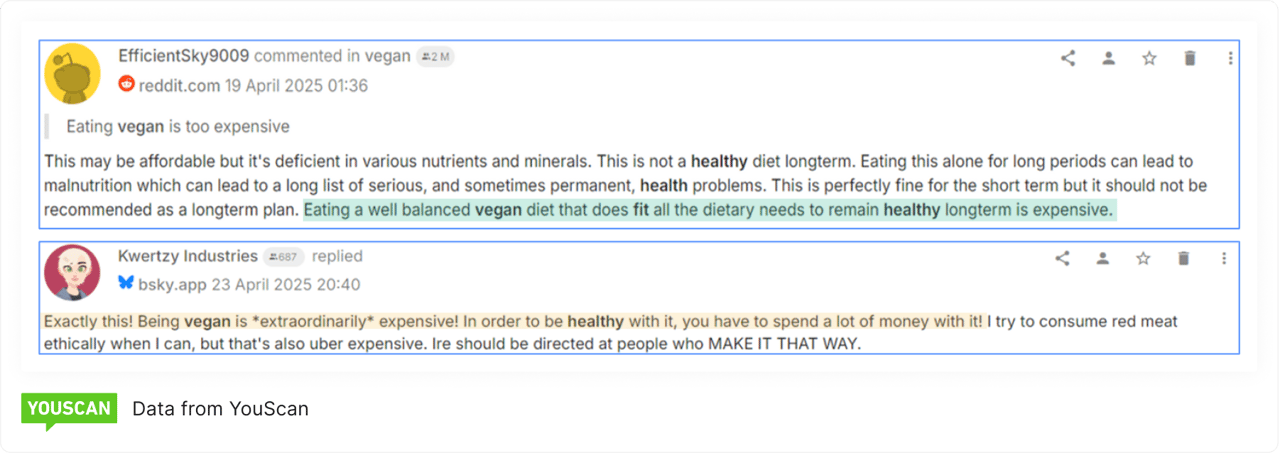Is Being a Healthy Vegetarian Really that Expensive?

The article is fully authored by YouScan's Ambassador Shubhangi Agarwal. She is a social insights analyst with expertise spanning social listening, social media auditing, social media measurement, and search listening.
My family, we have always been vegetarians. But I wouldn’t really classify us as “healthy” vegetarians. We ate what we ate - potato, white rice, and spice-rich food has always been a staple in my Indian household.
But ever since my brother became conscious of his “health”, things have changed. White bread has been swapped for sourdough, gluten for gluten-free, cow milk for almond milk, and our paneer (one among the very few sources of vegetarian protein) for soya, edamame, tempeh, protein powder, and the list goes on.
Much to the misery of my grandmum, our family matriarch, this has jacked up our house budget. How can she justify a 60-gram snack packet of edamame, costing 250 INR, when a 67-gram packet of chips costs just 1/8th that price? “Less for more” is difficult to grasp, and “healthy vegetarianism as a lifestyle is as expensive as they come.”
This sentiment has echoed enough through my house that I had to ask:
Is being a healthy vegetarian really that expensive - or does it just feel that way?
Curious, I turned to YouScan, a leading social listening platform, to dig into how people talk about the cost of healthy vegetarian, vegan diets and lifestyle. I analyzed 789K online conversations happening around the topic globally over the past month on social media, blogs, forums, and review sites, and here’s what I found:
Price matters, but not as much as you’d think!
Price ranks 7th amongst the 10 most talked about aspects of adopting a healthy vegetarian/vegan diet and lifestyle. Yes, price matters, but it’s not the top concern.
Interestingly, 22% of these price-related conversations are negative, the second highest among all aspects, making it one of the most emotionally triggering topics.


Globally, people are taking note of rising prices of fresh fruits and vegetables as well as supplements such as vegan protein.


A member of r/vegan thread put it bluntly saying “eating a well balanced vegan diet that does fit all dietary needs to remain healthy longterm is expensive”.


So, does that mean that being a healthy vegetarian is expensive? I went ahead to do a cross-tab analysis of how different aspects of a healthy vegetarian / vegan diet correlate with price. And here’s where it gets more nuanced.
Smaller sizes and lesser quantity do not make it expensive
Surprisingly, the data suggests that price and size & quantity are not as closely linked as I imagined them to be.
At home our debates mostly centered around portion sizes: “Why is a 60-not gram snack so expensive?” . But online conversations tell a different story. Only 12.4% of price mentions spoke about size, quantity and portion sizes.
-1747732587.png)
-1747732587.png)
Essentially, people are not really bothered about cost per gram. Size and quality when spoken of in relation to price is almost an “afterthought”, a “good to have”.
-1747732617.png)
-1747732617.png)
Low health outcomes and quality does
What matters to them is health outcomes and quality of such diets. Nearly half (47.4%) of the conversations around price also spoke of health outcomes and 40.3% of conversations around price also spoke of quality. People are willing to pay a premium but only if they believe they are getting measurable health returns.
If a diet, snack or supplement doesn’t deliver - it’s price is not just high but unjustified.
-1747732657.png)
-1747732657.png)
This could explain why home cooking is becoming a popular alternative - for it is not only perceived healthier but also more affordable. There’s a whole community supporting one’s ambition to cook to pursue a heathy vegetarian / vegan lifestyle.
Words like “easy”, “recipe”, “recipes” and “make” ranked among 10 most used words across all conversations relating to heathy vegetarian / vegan diets and lifestyle.
In fact, nearly half i.e., 47% of the conversation around healthy vegetarian / vegan diets are happening on Pinterest. Wherein, 9 out of 10 of the most engaging posts are indeed recipe shares.
-1747732745.png)
-1747732745.png)
So when today, a consumer looks at a healthy vegetarian product, they are not just comparing it to other “healthy” options. They stack them up against the gold standard of home cooking. And if a product can match if not beat that in health outcomes and benefits, they are ready to pay even a premium for it!
-1747732774.png)
-1747732774.png)
What does this mean for businesses?
If you are a businesses catering to those following or looking to follow a healthy vegetarian / vegan lifestyle and diets, here’s the key takeaway:
Invest in R&D to create truly health efficacious, quality snacks, supplements, menus. Consumers are scrutinizing results not just labels.
Limit SKUs not quality. A small portfolio of high quality products will likely sell better than a broad portfolio of low quality ones.
Join the conversation. Integrate into online communities around health and cooking, share recipes and position your product as an alternative to home cooking.
So, is being a healthy vegetarian expensive?
No—not if it works. What’s expensive is paying more for a product that doesn’t deliver.
The challenge isn’t lowering the price. It’s increasing the value.




